Is socialism the answer?
SUGGESTED



–
I’ll start by clarifying what I mean by “socialism”, because even though agreeing on a common definition should be the easy bit, experience shows that in this case, it is usually anything but.
I don’t have a particularly imaginative definition of my own. I simply stick, quite strictly, to the dictionary definition, which states:
“…collective or governmental ownership and administration of the means of production and distribution of goods”
Or alternatively:
“…a system […] in which the means of production are owned and controlled by the state”
If you apply those definitions, it becomes crystal clear which countries are, or were, socialist, and which countries are, or were, not. The former Soviet Union was definitely socialist, according to the dictionary definition. The Soviet Union’s Eastern European allies were definitely socialist. Maoist China was definitely socialist. Albania under Enver Hoxha was definitely socialist. North Vietnam was definitely socialist. North Korea is definitely socialist. Venezuela has, at least, moved a very long way into that direction.
It is also clear what that definition does not cover. It does not cover market economies with slightly higher taxes and slightly larger welfare states than in the UK, such as Sweden and Denmark. These are not socialist economies. They are just market economies with high taxes. This is not a difference in degree, but a qualitative difference.
This should be the easy bit. This should be uncontroversial. I haven’t expressed any opinion yet. I have just read out a dictionary definition, and applied it to a number of examples.
But that’s not how this works. The problem with debating socialism is that whenever somebody mentions any real-world example of socialism in action, socialists throw up their hands in horror, and protest, “Oh come on! That’s just silly. That’s a cheap shot. Obviously, nobody is talking about that kind of socialism. That wasn’t really socialism anyway. Our kind of socialism will be completely different.”
This is, of course, always easy to say. But it just so happens that I have recently finished writing a book on the history of this that-wasn’t-REAL-socialism claim, on the claim that socialism was a great idea, which has just always been “corrupted” in practice. What I show in the book is that this claim is usually only made after the event, that is, after a particular model of socialism has already been widely discredited, and has become an embarrassment for the socialist cause. That is when socialists suddenly discover that this model was never “really” socialist to begin with, and therefore tells us nothing about socialism.
But as long as a socialist project is in its prime – as long as it seems to have some initial success – virtually nobody disputes its socialist credentials. At that stage, socialists want to take the credit for its supposed achievements. At that stage, they do claim it as “theirs”. Virtually every socialist project in history has gone through a honeymoon period, during which it was widely and enthusiastically endorsed by plenty of prominent Western intellectuals. It is only when things go downhill that they suddenly withdraw that badge of authenticity.
This has been going on for nearly a century, and it’s always the same pattern. A honeymoon period of enthusiastic endorsement, followed by a period of radio silence, followed by a period of retroactive disowning.
It started with the Soviet Union. Today, it is considered a cheap shot to mention the Soviet Union in the presence of a self-described socialist. You could almost do a Fawlty Towers episode entitled “Don’t mention the Soviet Union”. But this wasn’t always so. In the 1930s, Soviet socialism was all the rage among Western intellectuals. There were literally thousands of people – journalists, academics, artists and so on – who went on a political pilgrimage to the Soviet Union, and who came back starry-eyed, saying, “I have seen the future! They are building a new type of society there, and it’s inspiring and wonderful.”
This lasted for a little over a decade. Then the Soviet Union began to fall out of fashion. What’s interesting about the ensuing period is that very few of Stalin’s former admirers publicly admitted that they had been wrong. They just fell silent on the issue, and pretended that it had never happened. This is how Soviet socialism retroactively became not-REAL-socialism.
Then a generation later, in the 1960s and early 1970s, the same thing happened again. Except that this time, Maoist China was the utopia du jour.
Again, thousands of Western intellectuals, including some very prominent figures, went on political pilgrimages to China, and came back saying: “This is the future! Soviet socialism was a fraud, but this – this is the real deal. This is real socialism. This is a true workers’ and peasants’ democracy.”
Like Stalin-mania, Mao-mania also lasted for a little over a decade, and then began to fall out of fashion. And, once again, it was not followed by any soul-searching. Former Mao admirers in the West just fell silent, pretended it never happened, and lived it down. This is how Maoism retroactively became not-REAL-socialism.
After that, there were a couple of more exotic examples, which never attracted mass pilgrimages, but which nonetheless had their fair share of relatively prominent Western admirers. North Korea was one of them. Nowadays, mentioning North Korea as an example of socialism is considered the ultimate straw man. But this wasn’t always so. North Korea was once hailed as a model of true socialism by quite a few Western socialists. So was Albania for a while, and even Cambodia.
The specifics differed, but it was always the same pattern: a period of enthusiastic endorsement, followed by a period of move-along-nothing-to-see-here, followed by a period of retroactive disowning. “Real” socialism always become un-real in retrospect when it fails.
The latest episode in this endless series was, of course, Venezuela. From the mid-2000s for roughly a decade, Venezuela was all the rage. It was super-fashionable to be pro-Venezuela. I remember how, towards the end of my undergraduate studies, you could see Venezuela flags everywhere at my university. And all the trendy people, like Naomi Klein and Owen Jones, went on pilgrimages there, and praised it to the skies.
When Venezuela collapsed a few years ago, Western socialists did what they always do, and have been doing for a century: they went silent, and pretended it had never happened. And now, they claim that Venezuelan socialism was not “real” socialism.
For example, John McDonnell now says that Venezuela is not a socialist country. He had literally described it as “socialism in action” just a couple of years ago. But it’s not just him. He’s in good company. This is the way it always works with socialism. It’s always real socialism. Until it starts to the fall apart. And then it no longer is, and in retrospect, it never was.
This is, in a nutshell, the reason why socialism remains so popular today, despite the fact that it fails every single time. Whenever it fails, socialists simply assert that it wasn’t “real” socialism, and they always get away with it.
And this is why the battle of ideas is not a level-playing field. We judge capitalism by its real-world shortcomings – which exist, and which I’m prepared to acknowledge – but we judge socialism only as an abstract ideal. So of course, socialism always wins.
But you need to compare like with like. You can either compare real-world examples with other real-world examples, or you can compare a theoretical ideal to another theoretical ideal. If you do the former, you have to compare North Korea to South Korea, East Germany to West Germany, Maoist China to Taiwan and Hong Kong during the same period, and so on. If you do the latter – if you try to imagine an idealised form of socialism – then you have to do the same with capitalism as well. You have to concede that classical liberal ideals have never been realised in pure form either. You can’t just assume that capitalism has no further scope for improvement, but that socialism has infinite scope.
In any half-way realistic comparison, capitalism wins hands-down. Yes, socialism is the answer. But only if the question is “Which system has failed catastrophically every single time it’s been tried, but remains popular despite everything?”
2 thoughts on “Is socialism the answer?”
Comments are closed.





In an argument, the left constantly point towards places such as Denmark, Sweden, Norway as examples of successful “Socialist” countries. However, according to the definition, these countries are not Socialist countries because the government does not own the means of production or redistribute wealth. Socialist as in the traditional meaning of the collective ownership of the means of production? No. Nordic countries are capitalist countries where comprehensive measures are taken to promote social justice and equality (both economic and societal). Many view Sweden as socialist. However, the country is in fact very pro capitalism, but does it with redistribution through taxes. According to John Henschen, personal income is taxed at a rate of 61.85 percent, plus a 7 percent social security tax rate for employees. On top of these taxes, Sweden also has a 25 percent consumption tax. To conclude, the Nordic countries are capitalist countries with a high corporate tax rate.
The reason it remains popular is because capitalism oppresses the lower classes, just as feudalism did. People will keep trying to find alternatives, and the only alternative to a privately owned economy is a collective or worker owned economy. Socialism can mean so many things, it’s foolish to dismiss all forms of it as not having worked. Modern socialists are learning from the mistakes of the USSR, China, the Venezuela, etc. Someday, maybe when the capitalist economy becomes even more unfair through monopolization, people will try to make a socialist nation again. Until a better system is found, or capitalism is reformed enough across the world, these types of revolutions will keep happening.